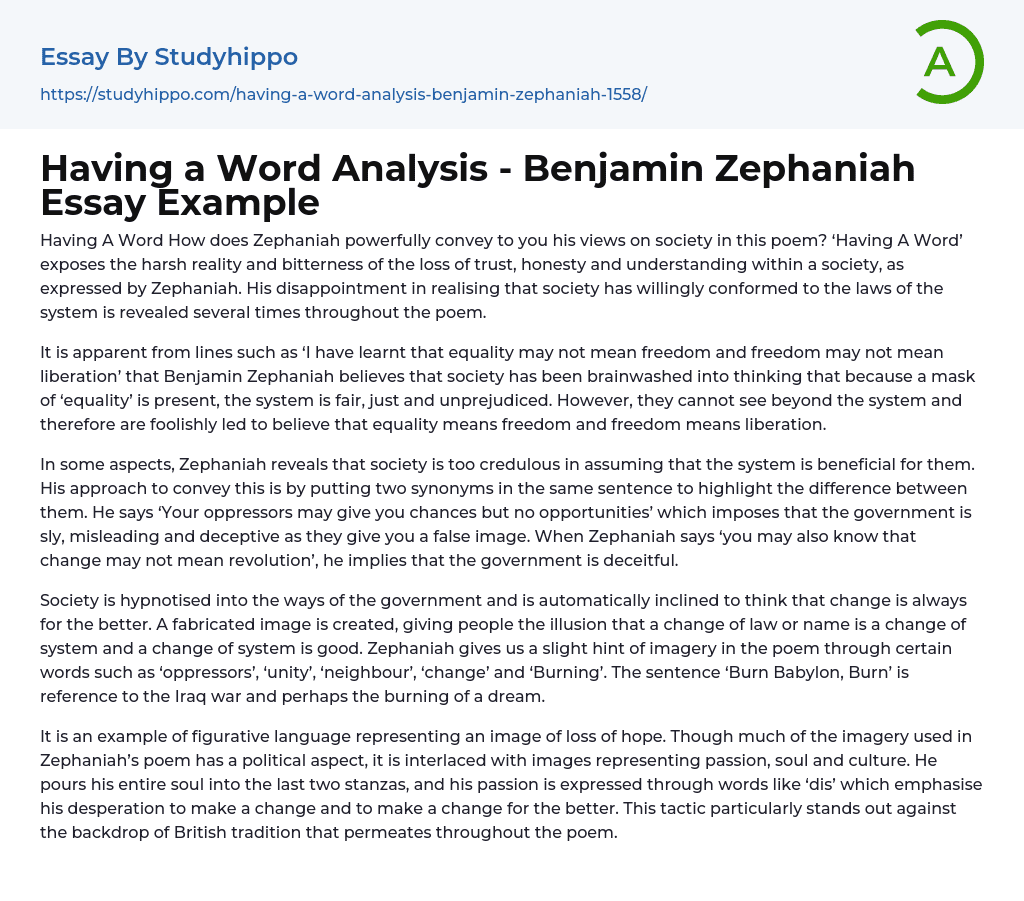

Having a Word Analysis – Benjamin Zephaniah Essay Example
Having A Word How does Zephaniah powerfully convey to you his views on society in this poem? ‘Having A Word’ exposes the harsh reality and bitterness of the loss of trust, honesty and understanding within a society, as expressed by Zephaniah. His disappointment in realising that society has willingly conformed to the laws of the system is revealed several times throughout the poem.
It is apparent from lines such as ‘I have learnt that equality may not mean freedom and freedom may not mean liberation’ that Benjamin Zephaniah believes that society has been brainwashed into thinking that because a mask of ‘equality’ is present, the system is fair, just and unprejudiced. However, they cannot see beyond the system and therefore are foolishly led to believe that equality means freedom and freedom means liberation.
In
...some aspects, Zephaniah reveals that society is too credulous in assuming that the system is beneficial for them. His approach to convey this is by putting two synonyms in the same sentence to highlight the difference between them. He says ‘Your oppressors may give you chances but no opportunities’ which imposes that the government is sly, misleading and deceptive as they give you a false image. When Zephaniah says ‘you may also know that change may not mean revolution’, he implies that the government is deceitful.
Society is hypnotised into the ways of the government and is automatically inclined to think that change is always for the better. A fabricated image is created, giving people the illusion that a change of law or name is a change of system and a change of system is good. Zephaniah gives us a slight hint of imagery
in the poem through certain words such as ‘oppressors’, ‘unity’, ‘neighbour’, ‘change’ and ‘Burning’. The sentence ‘Burn Babylon, Burn’ is reference to the Iraq war and perhaps the burning of a dream.
It is an example of figurative language representing an image of loss of hope. Though much of the imagery used in Zephaniah’s poem has a political aspect, it is interlaced with images representing passion, soul and culture. He pours his entire soul into the last two stanzas, and his passion is expressed through words like ‘dis’ which emphasise his desperation to make a change and to make a change for the better. This tactic particularly stands out against the backdrop of British tradition that permeates throughout the poem.
- Business Law essays
- Contract essays
- Consumer Protection essays
- Property essays
- Ownership essays
- Agreement essays
- Common Law essays
- Contract Law essays
- Justice essays
- Security essays
- Tort Law essays
- United States Constitution essays
- Crime essays
- Lawsuit essays
- Treaty essays
- Family Law essays
- Marijuana Legalization essays
- Constitution essays
- War on Drugs essays
- Court essays
- Jury essays
- Police essays
- Protection essays
- Community Policing essays
- Criminal Law essays
- Judge essays
- Lawyer essays
- Employment Law essays
- Copyright Infringement essays
- Injustice essays
- Intellectual Property essays
- Breach Of Contract essays
- Jurisprudence essays
- Social Injustice essays
- Juvenile Justice essays
- Internet Privacy essays
- Cyber Security essays
- Bill Of Rights essays
- Civil Liberties essays
- First Amendment To The United States Constitution essays
- Fourth Amendment To The United States Constitution essays
- Second amendment essays
- Animal Cruelty essays
- Law Enforcement essays
- Juvenile Justice System essays
- Surveillance essays
- Forensic Science essays
- Crime Prevention essays
- Criminal Justice essays
- Criminology essays



